UBB.classicTM 6.3.1.2
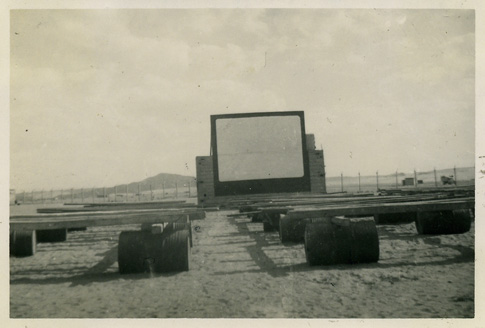
quote:There’s a photograph in Dads album of the cinema and when I get the chance to scan it I’ll post it on here too. I think he may even have a programme of upcoming shows for March 1942…
Desert Cinema
Long, long ago (actually it is less than two years) conditions bordered on the primitive, or so it seemed to those accustomed to towns and cities. There were no baths and no electricity was available for lighting. The canteen and the dining hall had not been built. After sunset the only possibility of change was the nearest cinema, two miles down the road.
Half an hours walk! At home with a wife or girl for company, it would not have been a great burden. Had the cinema been of the super type with comfortable seats with usherettes whose dazzling charms compelled a second glance, the burden would have been bravely borne. But it was a bare hall with little or no decoration. The khaki of the “Pongoes” (our term for the military: origin and meaning unknown!) predominated. The films had reached the last stages of decrepitude. Half a dozen breaks during one performance were to be expected. The lighting was poor and the sound worse. Previous operators had frequently connected the wrong broken ends so that the end of a story sometimes came in the middle of the film which, in any case, had been cut and mutilated almost out of recognition.
Plans had been made for another cinema to be built between our station and the adjoining camp, but, in Egypt, the Spanish “Manana” is developed into a fine art, only here it is called “Bokra” (tomorrow) or worse still, “bardin” (presently). And for six months it had been a case of “bardin” with this new cinema.
Christmas loomed ahead. The lower deck was to be well looked after during the festival. But what of the new year?
The Captain decided that a move of sorts, however temporary, must be made. The cinema proprietor was offered a hangar if he would install the necessary apparatus and seating. He agreed, but there was one difficulty. Could we supply operators? Yes, we could do that. And so it happened.
Some few days elapsed before the standard of the performance even equalled that down the road, our operators, accustomed to first class cinemas at home, aged perceptibly. The lighting was never good and again the sound was worse. After a few weeks, the flimsy rush-seated chairs began to disintegrate. Even the officers settee’s at the back developed a morning after the night before appearance. But it was better than nothing and it did do away with that two mile walk before and after.
Then, without much warning, the people to whom the hangar belonged issued an edict that it must be restored to the use for which it was erected. The cinema proprietor was not worried. His new building was almost finished. But it had not been erected on the site originally chosen. True, it was not quite two miles away but for all practical purposes it might have been.
About this time the Captain went sick and a new one took over command whilst his ship was being repaired. A new Commander also joined us. Both got going in no half hearted way and, within a fortnight the cinema projector of the ship under repair had been given to us and arrangements had been made for the station to receive two films a week from the Naval Film Unit.
So far so good! But we still had no house for our cinema. The four months of winter were a long way off so an open air cinema was decided on. A convenient brick built store became the operating box. The aperture was a window. A wooden screen was fastened to an empty aircraft packing case but, when it had been up a few hours and the first show was almost due to begin, some lunatics, never discovered, knocked it down. “Broken by fools”, to misquote Kipling. However there were more willing helpers than fools about the place and the damage was quickly repaired.
The next difficulty was the seating. Empty oil drums and lengths of rough hewn 6” by 6” timber solved that. And so we came to the first night.
Few of us had been to an open air cinema before. At that time of the year the clear star-lit sky was a better roof than most and the cool air of evening was an improvement on the smoke-laden atmosphere of most provincial cinemas.
For fifteen minutes or so the music of gramophone records was relayed through the loud-speaker of the screen. It was clear and distinct. The reproduction was excellent. But what of the light for the films? The projector was a portable one. We were throwing a beam as long as that in most picture houses. They were closed. Ours was open. We could hardly afford to fail. However charming they may be as individuals, in the crowd the men are inclined to be merciless. A flop now and all good intentions and efforts of those who had done their best to bring the cinema into existence would be forgotten. There would be one big almighty “bird”.
The music stopped. For a second our hearts were in our mouths. Then the picture was flashed on to the screen and, the heavens be praised, all was well. It was more than well. It exceeded our greatest hopes. The lighting was as good as any cinema anywhere.
The men muttered a mild “Oo-er!” We felt like throwing our caps in the air.
Ours is but a single projector and consequently intervals are necessary for the changing of spools. The audience was at first inclined to regard these as they did the many breaks in the cinema down the road and to vociferate accordingly. But the operators became expert at switching over quickly to gramophone records. They became even more expert at quick changing of spools, and now the breaks only cause a little ribald laughter when they happen in the middle of a tender, romantic embrace or at a particularly dramatic part in the story.
People soon began to get ideas about seating. The majority brought the pillows from their beds (what luxury! Our pillows during the last war were kitbags and a pair of boots). Some were more enterprising. One couple produced from goodness knows where a complete and comfortable car seat, complete with back, which they placed and guarded in the centre aisle. One or two officers drove up to the side of the arena in cars and continued to use the cars as private boxes. This put ideas in the heads of Petty Officers and N.C.O’s and, the week following, one could hardly get near the cinema for lorries full of crowded and comfortable seats. When, not to be outdone, the younger officers began to collect the wardrobe furniture, the limit had obviously been reached.
By this time the weather was getting colder and, let there be no doubt about it, the weather can be cold in these parts. But it was still impossible to obtain any covered accommodation and so we had to continue to make do with what we already had.
The dress circle lorry riot was dealt with immediately. Two lorries, with forms, were allocated to chief and petty officers one night and to the members of the wardroom another night. All other vehicles were forbidden access. To help keep them out and to protect the audience from the cold winds, aircraft packing cases were arranged around the cinema area. These have since been fitted with lights. The place is a little more like a place of entertainment but we still have the sky for a ceiling and the only regulating the temperature gets its what nature itself gives it.
As this is being written, a new cinema is being prepared. It too will be roofless but it will have a sloping floor. An innovation will be the seats built of mud bricks which ought to give it something of the appearance of an old Roman amphitheatre.
If the place leaves something to be desired during the winter months, it will be ideal when the warmer weather comes. Meanwhile the films continue to reach a high standard both as regards quality and age. Technicolour is not a stranger to us. Once or twice we have actually had films shown here before they were generally released throughout the rest of the country.
But man is never satisfied. We look forward to the day (very soon now we hope) when the enemy will have been cleared out of North Africa and the Mediterranean opened for shipping. When that time comes there ought to be a much quicker mail service and a bigger supply and consequently a greater choice of films.
Then we hope that other day will not be far distant when we too pass through the “Med” and join you once again in the weekly visit to the local “flicks”.
Our desert cinema will sooner or later have to be left to the sand, the sun and the wind. What the Archaeologist of ten thousand years hence will make of its remains we shudder to contemplate. At least let us hope he will never decipher the inscriptions.
December, 1942
C.G Kerslake.
![[Cool]](cool.gif)
![[Big Grin]](biggrin.gif)
![[Smile]](smile.gif)
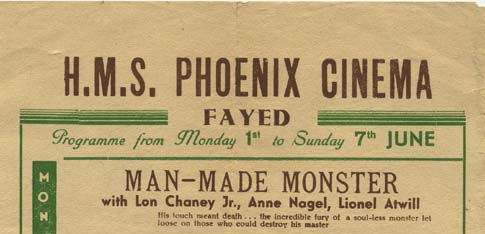
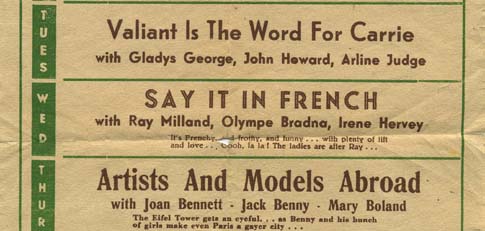
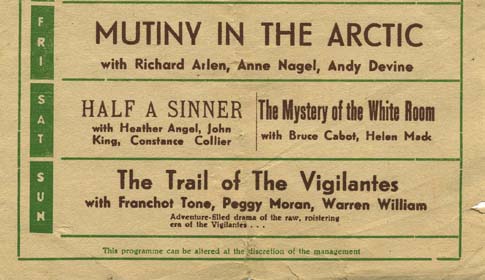
![[Smile]](smile.gif)
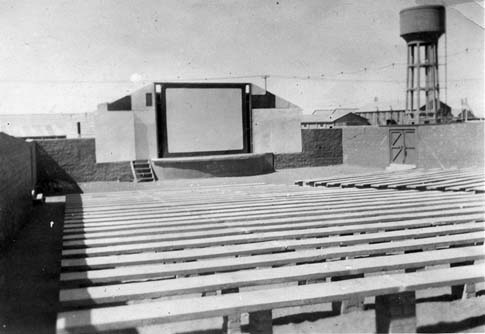
![[Cool]](cool.gif)
![[Big Grin]](biggrin.gif)
![[Wink]](wink.gif)
quote:Oh my god! Does that mean we won the war?
the only problem was he was on guard duty, so although he got to see the whole fim for free, it was from behind the screen and the image was reversed
![[Big Grin]](biggrin.gif)